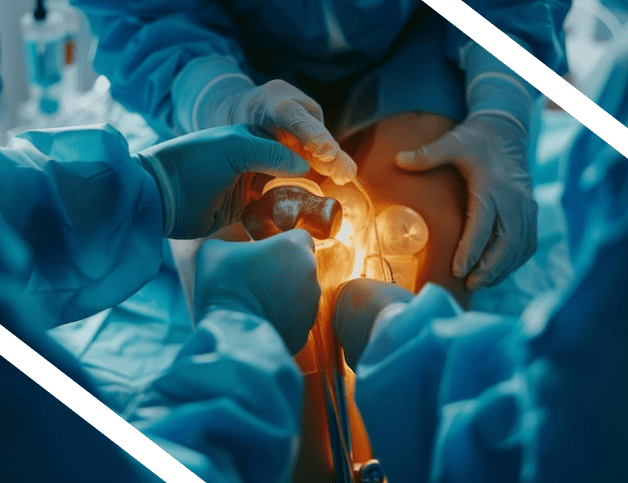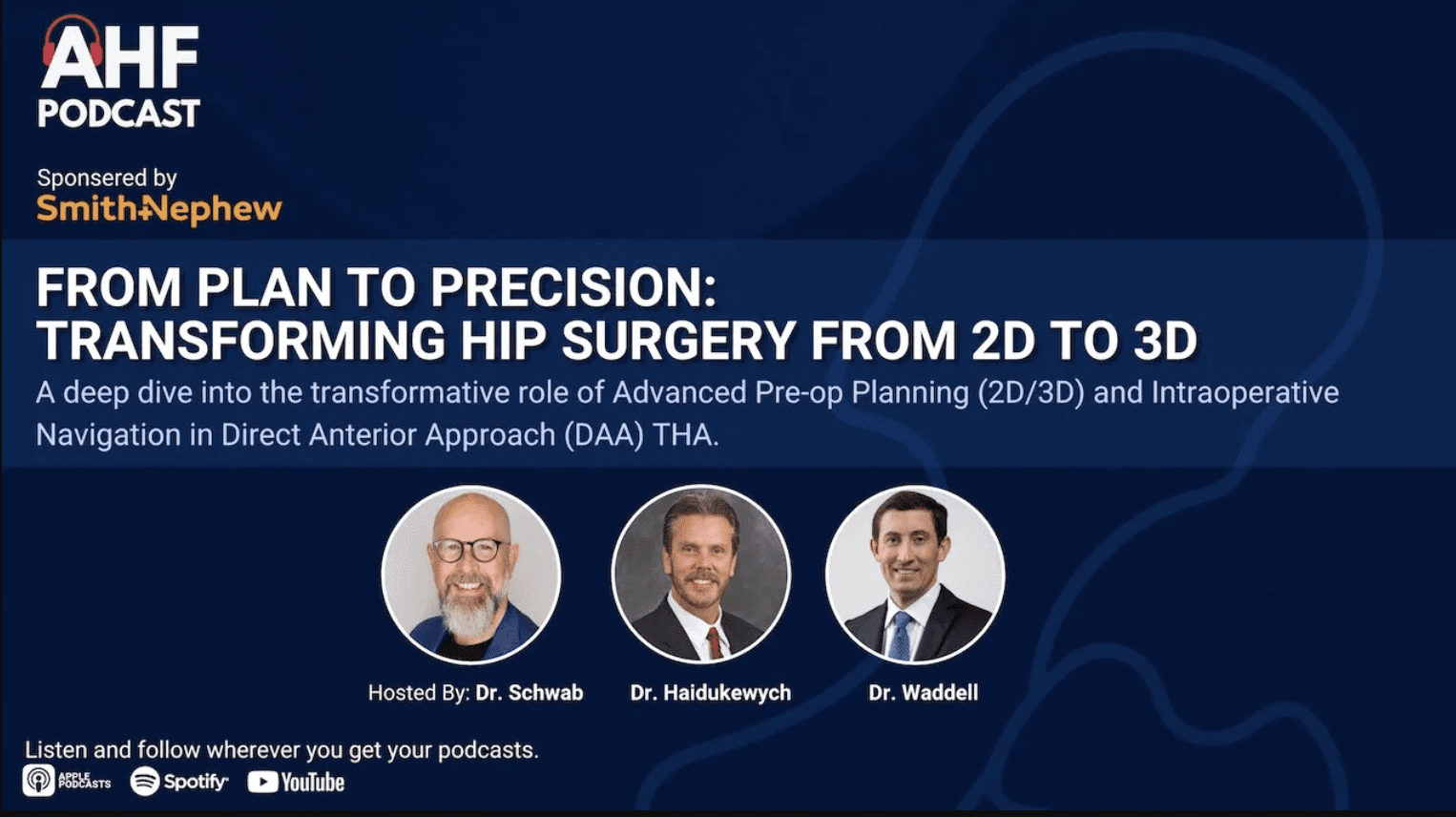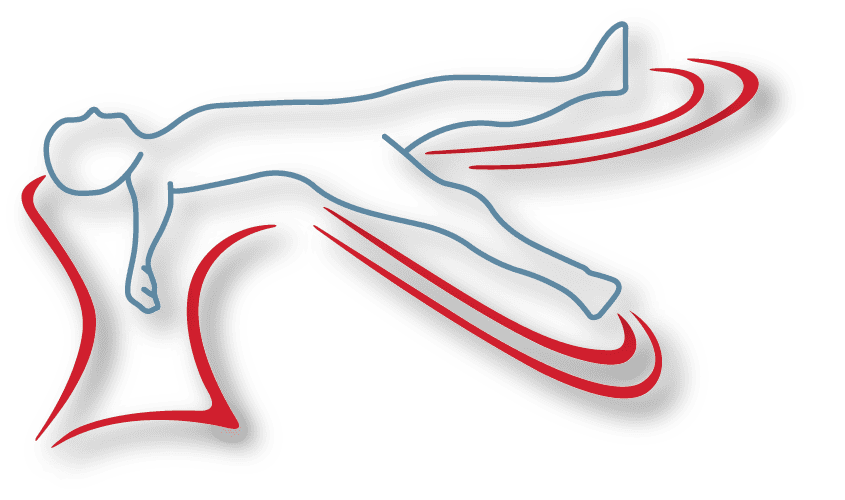Anterior Revisions and My First Anterior Approach Primary THA
Anterior Hip Foundation Founder, Dr. Joel Matta, describes how he came to perform his first primary anterior approach total hip on a patient in the US, and how his previous anterior revisions and use of fluoroscopy shaped the technique we know today. Read more about the beginning of his path to anterior hip arthroplasty and how his acetabular fracture training laid its foundations.
Dr. Matta's first primary anterior total hip in the US was requested by a patient
In 1996, I was 16 years into my orthopedic practice and focused on hip and pelvis fractures, hip preservation and primary plus revision THA. I had left the full time faculty at USC in 1990 and was granted a semi-academic position as the John C Wilson, Jr Chair of Orthopedics at Good Samaritan Hospital, Los Angeles. Charles Munger, Chairman of the Board at Good Samaritan Hospital had the vision to encourage academics and innovation at a private hospital without the politics, bureaucracy and loss of intellectual property ownership that typically was present in a University setting.
I was contacted by a patient from Washington State who wished to have a THA. Unusually, he wanted his THA done through the anterior approach. He told me that he had had his right hip replaced while he was living in Paris and was extremely happy with the result. He had been searching the US for someone who had trained with Letournel and who could replace his left hip through an anterior approach. That’s how he found me.
I explained that despite my past contact and instruction from Letournel, I had continued with Sarmiento’s posterior method. I was however very familiar with the anterior approach and performed it frequently for peri-acetabular osteotomy and I did use the Judet orthopedic table at my hospital for acetabular fracture surgery. I told the patient that if he wished, I would perform his THA through an anterior approach on the Judet table though he would be my first anterior THA. He accepted, and I performed an anterior THA, and the patient and I were both very pleased with the outcome.
Anterior Approach Revision Surgery
Paradoxically, over the previous 10 years earlier, I had used an anterior approach for selected revision THA cases. In some instances that required extensive reconstruction for acetabular bone loss, I chose an anterior approach over a posterior because of its proximal extensile capabilities. A posterior approach is extensile distally for the femur however it is not extensile for the innominate bone because proximal extension is limited by the inferior and superior gluteal nerves. An extensile approach to an extremity is classically and correctly described by Arnold Henry as “following the inter-nervous plane which makes anterior approach the extensile approach to the hip”. (*)
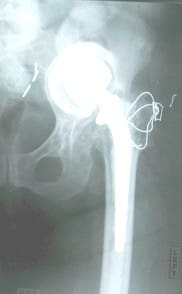
This was a Revision surgery performed in 1986 utilizing an anterior approach with access to the internal iliac fossa and the lateral aspect of innominate bone and acetabulum.
The cup and associated fractured cement were surrounded by a thin bony shell in the internal iliac fossa and along the pelvic brim.
A window was made in this shell and the cup was removed from inside the pelvis. The window was replaced and plated. The cavity was filled with impacted morselized allograft bone and a custom cup-cage device with an obturator foramen hook and iliac plate was used to bridge the defect and load the allograft.
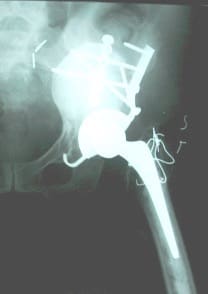
At this point, I thought that maybe I had missed something by following Letournel’s guidance regarding acetabular and pelvic fracture surgery and not adopting an anterior approach for primary THA. Using a posterior approach, I was also not able to prevent the problem of hip dislocation in a small but significant percentage of my patients. I thereby began my series of primary anterior THAs which has been a consecutive and unselected series of aTHAs from 1996 to the present.
I operated with the patient supine on the Judet table. I used a cemented stem and an uncemented cup – a common construct in 1996. To my dismay, I struggled with the operation. A procedure (posterior THA) that I knew well from Sarmiento’s tutelage and easily performed in one hour had been replaced with a 2 to 3-hour struggle. Unfortunately, Letournel had passed in 1993, so I could not go to him for instruction. During this initially difficult surgery, I would vow to abandon the anterior approach, however I was consistently impressed by the patient satisfaction and rapid recovery.
The use of the C-arm greatly enhanced the accuracy of cup position, leg length and offset.
I did remember however the ease and efficiency I saw when Letournel performed his anterior approach and I thought “there must be a way!” My spatial perception of factors such as neck cut, cup position, leg length and offset was impaired at the beginning so I utilized the C-arm for confirmation – which was easy with the patient supine and a radiolucent orthopedic table. Later, it became evident that use of the C-arm greatly enhanced the accuracy of cup position, leg length and offset. As my command of the anterior approach improved, surgical times dropped and my confidence increased. My surgical exposure was also improved by observing Kristaps Keggi in Waterbury, CT, and especially Thierry Judet, in Paris, France
(*) Henry A. Extensile Exposure. 2nd ed. Churchill Livingstone; 1973.
Read on to find out how a challenging patient inspired Dr. Matta to invent the femoral hook, and how his trusty custom car shop helped make that idea a reality.

